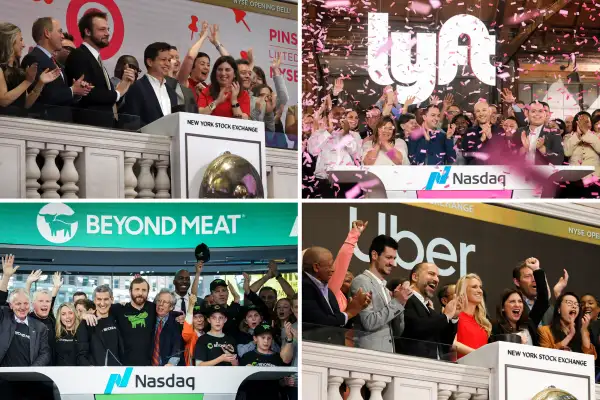Uber and Lyft Show the Danger of Buying Into a Hot IPO. Here's When You Should Actually Invest
Money is not a client of any investment adviser featured on this page. The information provided on this page is for educational purposes only and is not intended as investment advice. Money does not offer advisory services.

Two months ago, investors seemed like they couldn't wait to buy shares in ride-share darlings Uber and Lyft. Today, shares of both companies are reeling.
Initial public offerings can be tempting for investors, especially when they are hot tech names that offer products consumers already love. But experts say betting on individual stocks is risky. And when those stocks are untested (and perhaps unprofitable), aiming to make a quick buck by snapping up shares can be more like gambling than investing.
The first major tech company to IPO this year, ride-sharing service Lyft was valued at $17.6 billion when its shares priced at $72 in late March. The stock shot up to $88 on its first day, but then lost momentum – and hasn't recovered. It's at about $50 today, roughly 40% off its initial high.
Similarly, Uber went public last Friday, but endured a rocky first day of trading. Originally valued at $82.4 billion – making it the biggest IPO in the U.S. since Facebook – shares have fallen more than 15% from its $45 initial offering price.
With IPOs being rolled out at record levels in 2019, the number of companies going public is expected to surpass the record levels in 1999 and 2000. While companies like Lyft and Uber have stumbled out of the gate, some recent IPOs have fared better.
Social network Pinterest had an IPO price of $19 in mid-April. Today it's at almost $29. And Beyond Meat, the plant-based food company, had the year's best first day for a U.S. IPO when it went public at the beginning of May. The maker of vegan beef substitutes has seen its shares triple since its initial price of $25 to nearly $80.
Risky Business
While many of these new stocks may hold long-term potential, IPOs are still historically risky for Main Street investors. With the large amount of hype surrounding some of these new companies, IPOs can see prices jump initially simply because investor interest exceeds the number of shares actually being sold – as was the case with both Uber and Lyft.
What's more, with the bull market now more than a decade old, many of these companies are trying to cash in while they still can. "After the volatility of last year, companies want to take advantage of this window," says Mark Baribeau, Head of Global Equity at Jennison Associates.
To be sure, some of these companies could still turn out to be excellent investments.
Many IPOs have plummeted from their starting price but later gone on to be winning stocks. Facebook, for instance, was originally priced at $38 per share when it went public in 2012. The stock shortly plunged to less than $19, and it didn't reach its starting price again until 14 months later. Almost seven years later, Facebook is worth $180.
Should You Invest in the New IPOs?
Many IPO stocks will need some "seasoning and maturity," according to Howard Ward, Chief Investment Officer of Growth Equities at GAMCO. That's because investors are only just getting their first good looks at detailed company financials and still figuring out how best to analyze them. "It may take some time for them to grow into their valuations," he says.
As a result of this uncertainty, Ward suggests waiting for at least a few months after an IPO to make a purchase. Waiting a while can also often provide a better buying opportunity, since share prices frequently dip as investors' initial excitement wanes.
Ward also advises not investing, "unless you're comfortable understanding the valuations and willing to own the stock for a long time."
With companies like Uber and Lyft, whose worth investors have pegged in the tens of billions despite neither having ever turned a profit, that could be a tall order.